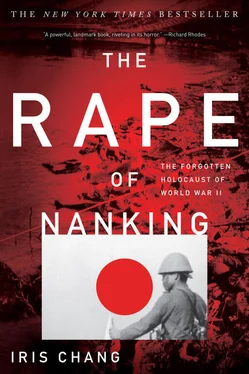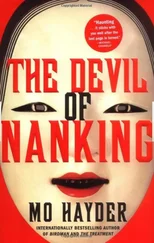Privately, however, Tang negotiated for a truce. Despite his original promise to fight to the last man, he seemed eager to do anything to avoid a showdown in the city. Supporting him in this stance were the few Americans and Europeans still in the city. These selfless individuals, about whom we will learn more later, had decided to remain in Nanking to do what they could to help and had created the International Committee for the Nanking Safety Zone. One of their first steps was to cordon off an area of the city and declare it the Nanking Safety Zone, or the International Safety Zone, with the understanding that anyone within the zone of two and a half square miles, Chinese or non-Chinese, was off-limits to the Japanese. Now, in a final effort to save lives, they offered to try to arrange a truce with the Japanese. Their plan was to suggest a three-day cease-fire, during which the Japanese could keep their present positions and march into Nanking peacefully while the Chinese troops withdrew from the city. Tang agreed to the proposed truce and asked the committee to send a message from him to Chiang Kai-shek through the U.S. embassy. The plan was transmitted by radio on the USS Panay gunboat to the Generalissimo. Chiang promptly rejected it.
On December 10, the Japanese waited for the city to surrender. At midday two Japanese staff officers stood outside the Mountain Gate in the eastern wall to see whether the Chinese government would send out a delegation with the flag of truce. When none arrived, the Japanese high command ordered a furious bombardment of the city.
The next few days saw intense fighting between the Chinese and Japanese troops around Nanking. The Japanese dropped bombs on the city and pounded the walls with heavy artillery fire. Tang would later reveal the gravity of the situation near certain landmarks and gates of the city in a long, rambling, and desperate telegram to Chiang Kai-shek:
From the 9th to the 11th of December the Japanese forced their way through Guanghuamen three times, first the military training corps tried to resist them, then the 156th division bitterly fought back, killing many of the enemy and holding the gate. Starting noon on the 11th, bad news came frequently from the Yuhuatai area, Andemen, Fongtaimen fell to the enemy, ordered immediately the 88th division to shrink the front-line, coordinate with the 74th army, 71st army, rapidly transferred 154th division to help.
But worse news awaited Tang, and this time the bad news would come not from the enemy’s successes but from Chiang himself. At noon on December 11, General Gu Zhutong placed a telephone call to Tang’s office. Orders had come directly from Chiang, Gu informed Tang, for a massive retreat of Tang’s forces. Tang himself was to hurry to Pukow, the site of a ferry and railway terminal that lay across the river from Nanking, where another general would wait to pick him up and bring him to safety.
Tang expressed shock. Aside from the fact that he was being asked to abandon his troops, an unattractive alternative for any leader, he had another very real problem—his troops were at that moment engaged in furious fighting. He informed Gu that the Japanese had already penetrated the troops’ front lines; an orderly retreat was not even a possibility. It would readily turn into a rout.
“I can’t worry about that,” Gu Zhutong said. “Anyhow, you have to retreat by tonight.”
When Tang again detailed the likely consequences of a sudden and hasty retreat, Gu reminded him that he, Tang, had been personally ordered by Chiang to “cross the river tonight.” Leave a subordinate behind to handle the situation if you have to, Gu told Tang, but “you must cross the river tonight,” he repeated.
Impossible, Tang said. The earliest he could cross the Yangtze was the next night. Gu warned him to leave town as soon as possible, for the situation with the enemy had grown urgent.
That afternoon Tang received a telegram from Chiang confirming the order: “Commander-in-Chief Tang, if you cannot maintain the situation you should take the opportunity to retreat in order to preserve and reorganize [the army] for future counterattack.—Kai. 11th.” Later that day the distressed Tang received a second telegram from Chiang, again urging retreat.
Unable to hold the line and under pressure, Tang complied. It was a decision that resulted in one of the worst disasters of Chinese military history.
At 3:00 A.M. on December 12, Tang held a predawn meeting at his home. As his vice commanders and top staff gathered before him, Tang told them sadly that the front had fallen, that there was no way for them to defend the gates of the city, and that Chiang Kai-shek had ordered the troops to retreat. He told his subordinates to prepare for the retreat by printing copies of the order and other related documents. That afternoon, at 1:00 P.M., the orders were distributed among the Chinese military.
But then electrifying reports reached Tang. Tang hoped to remove his troops via the Yangtze River. Now he learned that the Japanese navy was minesweeping the river to the east of the island of Baguazhou and steaming its way to Nanking. Its arrival would block that escape route, the last from the city. With the situation dire, Tang again approached the International Committee for the Nanking Safety Zone on 5 Ninghai Road, asking Eduard Sperling, a German businessman, for help in negotiating a truce with the Japanese. Sperling agreed to take a flag and message to the Japanese but later reported to Tang that General Matsui had refused his offer.
That afternoon, just minutes before his commanders gathered for a second meeting, Tang watched from the window of his house as an entire city took flight, the streets jammed with cars, horses, and refugees—the young and the old, the weak and the strong, the rich and the poor. Anyone with half a brain was determined to get out while he still could. At 5:00 P.M. the meeting began. It lasted only ten minutes. Many of the top military officials did not attend because communication between the field commanders and central command had all but collapsed. Others never received notification of the meeting because they had assessed the situation for themselves and run away.
The Japanese, Tang told those gathered in his home, had already broken through the gates of the city and penetrated the wall in three places. “Do you still have any confidence to hold the defense line?” he asked the group. Although he waited several minutes for a response, the room remained silent.
After this pause, Tang calmly discussed strategies for retreat. The evacuation would start within minutes—at 6:00 P.M.—and last until 6:00 A.M. the next day. One portion of the army—the 36th Division and the military police—would cross the river from Hsiakwan and gather at a designated village on the other side. The rest of the army, he announced, would have to force its way out of the Japanese encirclement, with the survivors congregating at the southern region of the Anhwei province. Weapons, ammunition, and communications equipment left behind were to be destroyed, and all roads and bridges in the path of the retreating army burned.
Later in the same meeting, Tang modified his order. He informed his men that if the 87th Division, 88th Division, 74th Army, and military training corps could not break through the Japanese encirclement, then they too should try to cross the river. Tang now gave five divisions the authority to cross the Yangtze River—doubling the original number of men involved in the operation. That evening Tang would himself journey to the docks. It would be a journey he remembered for the rest of his life.
Not surprisingly, the order to retreat threw the Chinese military into an uproar. Some officers ran about the city haphazardly informing anyone they came into contact with to pull out. These soldiers took off. Other officers told no one, not even their own troops. Instead, they saved their own hides. Their soldiers continued to fight the Japanese; thinking they were witnessing a mass desertion when they saw other troops fleeing, they machine-gunned hundreds of their fleeing comrades in an effort to stop them. In the haste and confusion to leave the city, at least one Chinese tank rolled over countless Chinese soldiers in its path, stopping only when blown up by a hand grenade.
Читать дальше











